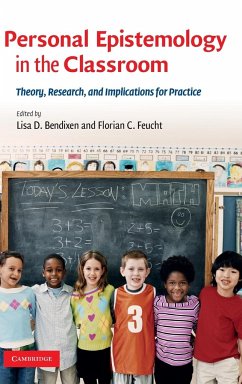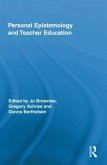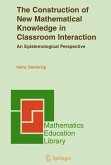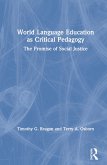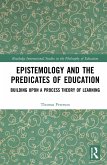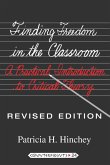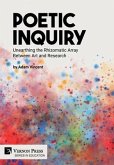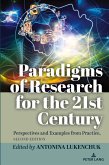Personal Epistemology in the Classroom
Herausgeber: Bendixen, Lisa D.; Feucht, Florian C.
Personal Epistemology in the Classroom
Herausgeber: Bendixen, Lisa D.; Feucht, Florian C.
- Gebundenes Buch
- Merkliste
- Auf die Merkliste
- Bewerten Bewerten
- Teilen
- Produkt teilen
- Produkterinnerung
- Produkterinnerung
Top researchers present theoretical and empirical work pertaining to personal epistemology in the classroom and consider its broader educational implications.
Andere Kunden interessierten sich auch für
![Personal Epistemology and Teacher Education Personal Epistemology and Teacher Education]() Personal Epistemology and Teacher Education253,99 €
Personal Epistemology and Teacher Education253,99 €![The Construction of New Mathematical Knowledge in Classroom Interaction The Construction of New Mathematical Knowledge in Classroom Interaction]() Heinz SteinbringThe Construction of New Mathematical Knowledge in Classroom Interaction79,99 €
Heinz SteinbringThe Construction of New Mathematical Knowledge in Classroom Interaction79,99 €![World Language Education as Critical Pedagogy World Language Education as Critical Pedagogy]() Timothy G. ReaganWorld Language Education as Critical Pedagogy205,99 €
Timothy G. ReaganWorld Language Education as Critical Pedagogy205,99 €![Epistemology and the Predicates of Education Epistemology and the Predicates of Education]() Thomas PetersonEpistemology and the Predicates of Education204,99 €
Thomas PetersonEpistemology and the Predicates of Education204,99 €![Finding Freedom in the Classroom Finding Freedom in the Classroom]() Patricia H. HincheyFinding Freedom in the Classroom26,10 €
Patricia H. HincheyFinding Freedom in the Classroom26,10 €![Poetic Inquiry Poetic Inquiry]() Adam VincentPoetic Inquiry66,99 €
Adam VincentPoetic Inquiry66,99 €![Paradigms of Research for the 21st Century Paradigms of Research for the 21st Century]() Paradigms of Research for the 21st Century56,95 €
Paradigms of Research for the 21st Century56,95 €-
-
-
Top researchers present theoretical and empirical work pertaining to personal epistemology in the classroom and consider its broader educational implications.
Hinweis: Dieser Artikel kann nur an eine deutsche Lieferadresse ausgeliefert werden.
Hinweis: Dieser Artikel kann nur an eine deutsche Lieferadresse ausgeliefert werden.
Produktdetails
- Produktdetails
- Verlag: Cambridge University Press
- Seitenzahl: 616
- Erscheinungstermin: 28. Januar 2010
- Englisch
- Abmessung: 235mm x 157mm x 37mm
- Gewicht: 1030g
- ISBN-13: 9780521883559
- ISBN-10: 0521883555
- Artikelnr.: 28108438
- Herstellerkennzeichnung
- Libri GmbH
- Europaallee 1
- 36244 Bad Hersfeld
- gpsr@libri.de
- Verlag: Cambridge University Press
- Seitenzahl: 616
- Erscheinungstermin: 28. Januar 2010
- Englisch
- Abmessung: 235mm x 157mm x 37mm
- Gewicht: 1030g
- ISBN-13: 9780521883559
- ISBN-10: 0521883555
- Artikelnr.: 28108438
- Herstellerkennzeichnung
- Libri GmbH
- Europaallee 1
- 36244 Bad Hersfeld
- gpsr@libri.de
Part I. Introduction: 1. Personal epistemology in the classroom: a welcome
and guide for the reader Florian C. Feucht and Lisa D. Bendixen; Part II.
Frameworks and Conceptual Issues: 2. Manifestations of an epistemological
belief system in preschool to grade twelve classrooms Marlene
Schommer-Aikins, Mary Bird and Linda Bakken; 3. Epistemic climate in
elementary classrooms Florian C. Feucht; 4. The integrative model of
personal epistemology development: theoretical underpinnings and
implications for education Deanna C. Rule and Lisa D. Bendixen; 5. An
epistemic framework for scientific reasoning in informal contexts Fang-Ying
Yang and Chin-Chung Tsai; 6. Who knows what and who can we believe?
Epistemological beliefs are beliefs about knowledge (mostly) to be attained
from others Rainer Bromme, Dorothe Kienhues and Torsten Porsch; Part III.
Students' Personal Epistemology, its Development, and its Relation to
Learning: 7. Stalking young persons' changing beliefs about belief Michael
J. Chandler and Travis Proulx; 8. Epistemological development in very young
knowers Leah K. Wildenger, Barbara K. Hofer and Jean E. Burr; 9. Beliefs
about knowledge and revision of knowledge: on the importance of epistemic
beliefs for intentional conceptual change in elementary and middle school
students Lucia Mason; 10. The reflexive relation between students'
mathematics-related beliefs and the mathematics classroom culture Erik De
Corte, Peter Op 't Eynde, Fien Depaepe and Lieven Verschaffel; 11.
Examining the influence of epistemic beliefs and goal orientations on the
academic performance of adolescent students enrolled in high-poverty,
high-minority schools P. Karen Murphy, Michelle M. Buehl, Jill A. Zeruth,
Maeghan N. Edwards, Joyce F. Long and Shinichi Monoi; 12. Using cognitive
interviewing to explore elementary and secondary school students' epistemic
and ontological cognition Jeffrey A. Greene, Judith Torney-Purta, Roger
Azevedo and Jane Robertson; Part IV. Teachers' Personal Epistemology and
its Impact on Classroom Teaching: 13. Epistemological resources and
framing: a cognitive framework for helping teachers interpret and respond
to their students' epistemologies Andrew Elby and David Hammer; 14. The
effects of teachers' beliefs on elementary students' beliefs, motivation,
and achievement in mathematics Krista R. Muis and Michael J. Foy; 15.
Teachers' articulation of beliefs about teaching knowledge: conceptualizing
a belief framework Helenrose Fives and Michelle M. Buehl; 16. Beyond
epistemology: assessing teachers' epistemological and ontological
worldviews Lori Olafson and Gregory Schraw; Part V. Conclusion: 17.
Personal epistemology in the classroom: what do research and theory tell us
and where do we need to go next? Lisa D. Bendixen and Florian C. Feucht.
and guide for the reader Florian C. Feucht and Lisa D. Bendixen; Part II.
Frameworks and Conceptual Issues: 2. Manifestations of an epistemological
belief system in preschool to grade twelve classrooms Marlene
Schommer-Aikins, Mary Bird and Linda Bakken; 3. Epistemic climate in
elementary classrooms Florian C. Feucht; 4. The integrative model of
personal epistemology development: theoretical underpinnings and
implications for education Deanna C. Rule and Lisa D. Bendixen; 5. An
epistemic framework for scientific reasoning in informal contexts Fang-Ying
Yang and Chin-Chung Tsai; 6. Who knows what and who can we believe?
Epistemological beliefs are beliefs about knowledge (mostly) to be attained
from others Rainer Bromme, Dorothe Kienhues and Torsten Porsch; Part III.
Students' Personal Epistemology, its Development, and its Relation to
Learning: 7. Stalking young persons' changing beliefs about belief Michael
J. Chandler and Travis Proulx; 8. Epistemological development in very young
knowers Leah K. Wildenger, Barbara K. Hofer and Jean E. Burr; 9. Beliefs
about knowledge and revision of knowledge: on the importance of epistemic
beliefs for intentional conceptual change in elementary and middle school
students Lucia Mason; 10. The reflexive relation between students'
mathematics-related beliefs and the mathematics classroom culture Erik De
Corte, Peter Op 't Eynde, Fien Depaepe and Lieven Verschaffel; 11.
Examining the influence of epistemic beliefs and goal orientations on the
academic performance of adolescent students enrolled in high-poverty,
high-minority schools P. Karen Murphy, Michelle M. Buehl, Jill A. Zeruth,
Maeghan N. Edwards, Joyce F. Long and Shinichi Monoi; 12. Using cognitive
interviewing to explore elementary and secondary school students' epistemic
and ontological cognition Jeffrey A. Greene, Judith Torney-Purta, Roger
Azevedo and Jane Robertson; Part IV. Teachers' Personal Epistemology and
its Impact on Classroom Teaching: 13. Epistemological resources and
framing: a cognitive framework for helping teachers interpret and respond
to their students' epistemologies Andrew Elby and David Hammer; 14. The
effects of teachers' beliefs on elementary students' beliefs, motivation,
and achievement in mathematics Krista R. Muis and Michael J. Foy; 15.
Teachers' articulation of beliefs about teaching knowledge: conceptualizing
a belief framework Helenrose Fives and Michelle M. Buehl; 16. Beyond
epistemology: assessing teachers' epistemological and ontological
worldviews Lori Olafson and Gregory Schraw; Part V. Conclusion: 17.
Personal epistemology in the classroom: what do research and theory tell us
and where do we need to go next? Lisa D. Bendixen and Florian C. Feucht.
Part I. Introduction: 1. Personal epistemology in the classroom: a welcome
and guide for the reader Florian C. Feucht and Lisa D. Bendixen; Part II.
Frameworks and Conceptual Issues: 2. Manifestations of an epistemological
belief system in preschool to grade twelve classrooms Marlene
Schommer-Aikins, Mary Bird and Linda Bakken; 3. Epistemic climate in
elementary classrooms Florian C. Feucht; 4. The integrative model of
personal epistemology development: theoretical underpinnings and
implications for education Deanna C. Rule and Lisa D. Bendixen; 5. An
epistemic framework for scientific reasoning in informal contexts Fang-Ying
Yang and Chin-Chung Tsai; 6. Who knows what and who can we believe?
Epistemological beliefs are beliefs about knowledge (mostly) to be attained
from others Rainer Bromme, Dorothe Kienhues and Torsten Porsch; Part III.
Students' Personal Epistemology, its Development, and its Relation to
Learning: 7. Stalking young persons' changing beliefs about belief Michael
J. Chandler and Travis Proulx; 8. Epistemological development in very young
knowers Leah K. Wildenger, Barbara K. Hofer and Jean E. Burr; 9. Beliefs
about knowledge and revision of knowledge: on the importance of epistemic
beliefs for intentional conceptual change in elementary and middle school
students Lucia Mason; 10. The reflexive relation between students'
mathematics-related beliefs and the mathematics classroom culture Erik De
Corte, Peter Op 't Eynde, Fien Depaepe and Lieven Verschaffel; 11.
Examining the influence of epistemic beliefs and goal orientations on the
academic performance of adolescent students enrolled in high-poverty,
high-minority schools P. Karen Murphy, Michelle M. Buehl, Jill A. Zeruth,
Maeghan N. Edwards, Joyce F. Long and Shinichi Monoi; 12. Using cognitive
interviewing to explore elementary and secondary school students' epistemic
and ontological cognition Jeffrey A. Greene, Judith Torney-Purta, Roger
Azevedo and Jane Robertson; Part IV. Teachers' Personal Epistemology and
its Impact on Classroom Teaching: 13. Epistemological resources and
framing: a cognitive framework for helping teachers interpret and respond
to their students' epistemologies Andrew Elby and David Hammer; 14. The
effects of teachers' beliefs on elementary students' beliefs, motivation,
and achievement in mathematics Krista R. Muis and Michael J. Foy; 15.
Teachers' articulation of beliefs about teaching knowledge: conceptualizing
a belief framework Helenrose Fives and Michelle M. Buehl; 16. Beyond
epistemology: assessing teachers' epistemological and ontological
worldviews Lori Olafson and Gregory Schraw; Part V. Conclusion: 17.
Personal epistemology in the classroom: what do research and theory tell us
and where do we need to go next? Lisa D. Bendixen and Florian C. Feucht.
and guide for the reader Florian C. Feucht and Lisa D. Bendixen; Part II.
Frameworks and Conceptual Issues: 2. Manifestations of an epistemological
belief system in preschool to grade twelve classrooms Marlene
Schommer-Aikins, Mary Bird and Linda Bakken; 3. Epistemic climate in
elementary classrooms Florian C. Feucht; 4. The integrative model of
personal epistemology development: theoretical underpinnings and
implications for education Deanna C. Rule and Lisa D. Bendixen; 5. An
epistemic framework for scientific reasoning in informal contexts Fang-Ying
Yang and Chin-Chung Tsai; 6. Who knows what and who can we believe?
Epistemological beliefs are beliefs about knowledge (mostly) to be attained
from others Rainer Bromme, Dorothe Kienhues and Torsten Porsch; Part III.
Students' Personal Epistemology, its Development, and its Relation to
Learning: 7. Stalking young persons' changing beliefs about belief Michael
J. Chandler and Travis Proulx; 8. Epistemological development in very young
knowers Leah K. Wildenger, Barbara K. Hofer and Jean E. Burr; 9. Beliefs
about knowledge and revision of knowledge: on the importance of epistemic
beliefs for intentional conceptual change in elementary and middle school
students Lucia Mason; 10. The reflexive relation between students'
mathematics-related beliefs and the mathematics classroom culture Erik De
Corte, Peter Op 't Eynde, Fien Depaepe and Lieven Verschaffel; 11.
Examining the influence of epistemic beliefs and goal orientations on the
academic performance of adolescent students enrolled in high-poverty,
high-minority schools P. Karen Murphy, Michelle M. Buehl, Jill A. Zeruth,
Maeghan N. Edwards, Joyce F. Long and Shinichi Monoi; 12. Using cognitive
interviewing to explore elementary and secondary school students' epistemic
and ontological cognition Jeffrey A. Greene, Judith Torney-Purta, Roger
Azevedo and Jane Robertson; Part IV. Teachers' Personal Epistemology and
its Impact on Classroom Teaching: 13. Epistemological resources and
framing: a cognitive framework for helping teachers interpret and respond
to their students' epistemologies Andrew Elby and David Hammer; 14. The
effects of teachers' beliefs on elementary students' beliefs, motivation,
and achievement in mathematics Krista R. Muis and Michael J. Foy; 15.
Teachers' articulation of beliefs about teaching knowledge: conceptualizing
a belief framework Helenrose Fives and Michelle M. Buehl; 16. Beyond
epistemology: assessing teachers' epistemological and ontological
worldviews Lori Olafson and Gregory Schraw; Part V. Conclusion: 17.
Personal epistemology in the classroom: what do research and theory tell us
and where do we need to go next? Lisa D. Bendixen and Florian C. Feucht.

